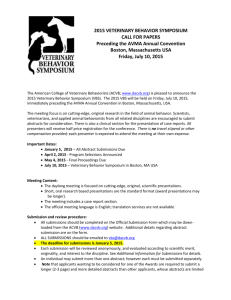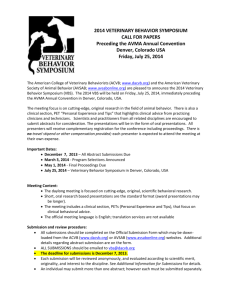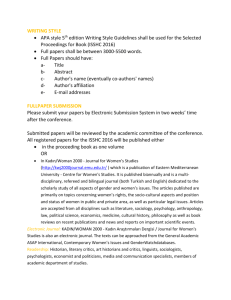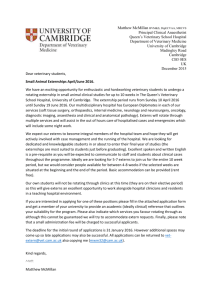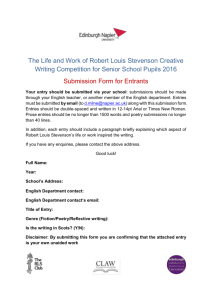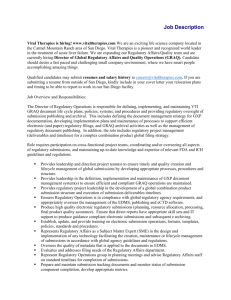to access the 2016 VBS Call for papers
advertisement
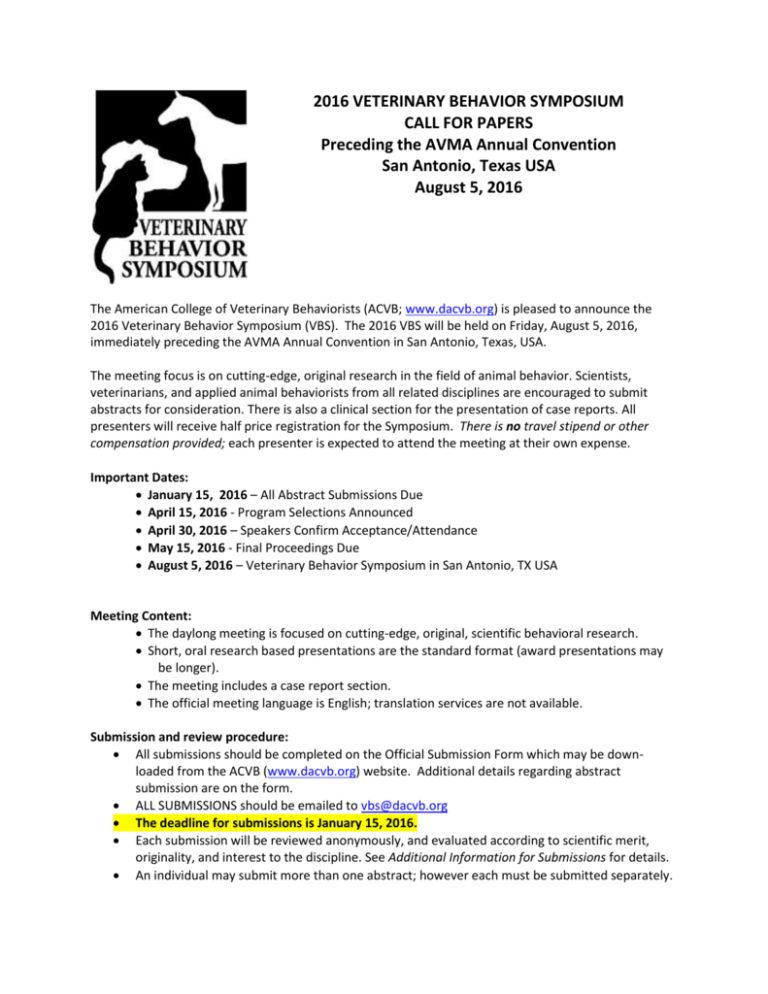
2016 VETERINARY BEHAVIOR SYMPOSIUM CALL FOR PAPERS Preceding the AVMA Annual Convention San Antonio, Texas USA August 5, 2016 The American College of Veterinary Behaviorists (ACVB; www.dacvb.org) is pleased to announce the 2016 Veterinary Behavior Symposium (VBS). The 2016 VBS will be held on Friday, August 5, 2016, immediately preceding the AVMA Annual Convention in San Antonio, Texas, USA. The meeting focus is on cutting-edge, original research in the field of animal behavior. Scientists, veterinarians, and applied animal behaviorists from all related disciplines are encouraged to submit abstracts for consideration. There is also a clinical section for the presentation of case reports. All presenters will receive half price registration for the Symposium. There is no travel stipend or other compensation provided; each presenter is expected to attend the meeting at their own expense. Important Dates: January 15, 2016 – All Abstract Submissions Due April 15, 2016 - Program Selections Announced April 30, 2016 – Speakers Confirm Acceptance/Attendance May 15, 2016 - Final Proceedings Due August 5, 2016 – Veterinary Behavior Symposium in San Antonio, TX USA Meeting Content: The daylong meeting is focused on cutting-edge, original, scientific behavioral research. Short, oral research based presentations are the standard format (award presentations may be longer). The meeting includes a case report section. The official meeting language is English; translation services are not available. Submission and review procedure: All submissions should be completed on the Official Submission Form which may be downloaded from the ACVB (www.dacvb.org) website. Additional details regarding abstract submission are on the form. ALL SUBMISSIONS should be emailed to vbs@dacvb.org The deadline for submissions is January 15, 2016. Each submission will be reviewed anonymously, and evaluated according to scientific merit, originality, and interest to the discipline. See Additional Information for Submissions for details. An individual may submit more than one abstract; however each must be submitted separately. Note that applicants wanting to be considered for one of the Awards are required to submit a longer (2-3 page) and more detailed abstract than other applicants, whose abstracts are limited to 500 words; however, when appropriate, short abstracts will be accepted for the Resident award for the final proceedings in order to avoid risk of jeopardizing publication. You may contact vbs@dacvb.org with specific questions regarding the application process. Additional Information for Submissions The Committee would like to encourage submissions from both practitioners and academics working either directly in the field or in related fields of interest. Submissions are due via e-mail by January 15, 2016 and authors of all submissions will be notified of the outcome of the review process by April 15, 2016. By May 15, 2016, authors of accepted submissions must submit a short paper (2-3 pages) suitable for publication in the proceedings. In the case of work destined for journal publication elsewhere, authors may emphasize the basis of the topic with brief details of the methods and key experimental findings in order to limit the risk of jeopardizing publication. However, full experimental results should be presented at the meeting. If final proceedings are not received by the due date of May 15, 2016, the committee will assume that the paper has been withdrawn by the applicant and it will not be scheduled for the meeting. Research Submissions: Each abstract should include a few sentences to place the work in context, but the majority of the abstract should be devoted to methods and results. Please include a brief conclusion at the end of your abstract. Research submissions will be anonymously judged on the following criteria: Relevance to the field of veterinary behavior Scientific rigor (soundness) of the submission Clear statement of hypothesis/objective Explanation of materials/methods Justification/support of conclusions Interest to the audience: While our audience is diverse, the largest segment of the audience is small animal private practice veterinarians with a special interest in behavior. While species will certainly play a role in the audience interest, it is NOT the sole factor. Study design, fundamental basic science questions and other factors may all impact interest level. The selection committee encourages all behavioral related research submissions. Case Reports or Case Series Submissions: Submissions will be anonymously judged on their practical content, relevance and evidence based merit. Unusual cases or those with unique presentations are encouraged. If novel treatments approaches are to be highlighted, a series of cases utilizing the approach may be given consideration over a single case. Cases covering any species will be considered and are encouraged. Please use the Veterinary Behavior Symposium Submission Form (found at www.dacvb.org) and submit electronically according to the instructions. Additional Award Information: The VBS R.K. Anderson ACVB Resident Award was established in 2005 to recognize outstanding research by those in ACVB residencies. It was created to honor ACVB Founding Member, Dr. R.K. Anderson. Eligibility o Applicant must meet the general submission deadlines. o Applicant must be a veterinarian in an ACVB approved residency or within one year of having completed an ACVB residency. o Papers for consideration must be in the area of applied animal behavior. Research on any species will be considered. o Previous award winners are ineligible. Submission Requirements o Interested applicants must designate their interest for award consideration on the application submission. o The submission abstract must be between 2-3 pages in length. (Proceedings published abstract can be shorter to avoid risk of jeopardizing publication.) o The abstract must contain sufficient information regarding the hypothesis, materials and methods, data, data analysis, results, discussion and pertinent references to permit evaluation of the scientific merit of the research. Final data, data analysis, conclusions and discussion are not required in the original submission but these will be required for the final proceedings. Presentations o The award recipient will have an extended oral presentation at the Veterinary Behavior Symposium. Award o $1500 check. o Complimentary registration to the Veterinary Behavior Symposium. o The award does NOT cover travel or other meeting related expenses. The Whitney Joy Engler Memorial Veterinary Student Research Award recognizes exceptional research performed by veterinary students in the field of animal behavior. Eligibility o Applicant must be a current veterinary student. o Applicant must be the first author of original research in the area of applied animal behavior conducted while in veterinary school. Submission Requirements o Submission is to be a full paper, written in the format of Journal of the Veterinary Medical Association (JAVMA; www.avmajournals.avma.org). Presentation o The 1st place award recipient will have an extended oral presentation at the Veterinary Behavior Symposium. Award o 1st Place: $1500 check. o Complimentary registration to the Veterinary Behavior Symposium. o The award does NOT cover travel or other meeting related expenses.
